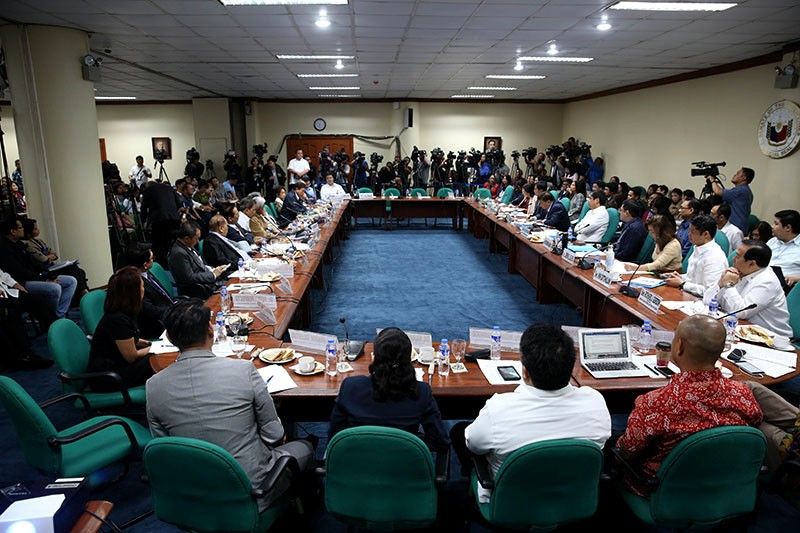SC: No advice on manner of congressional Cha-cha

MANILA, Philippines — The Supreme Court (SC) has junked a petition seeking its advisory opinion on the manner by which Congress should vote in amending the 1987 Constitution.
In session yesterday, the justices voted unanimously to dismiss the petition filed last month by Universidad de Manila associate law dean Arturo de Castro, asking the SC to decide if the Senate and the House of Representatives should vote jointly or separately in the proposed constituent assembly.
The SC held that the petition for declaratory relief was premature and should have been filed first before the regional trial court.
“The Supreme Court has no original jurisdiction over declaratory relief actions under Rule 63, the original jurisdiction over such actions is vested in the regional trial court,” it said.
The high court said that its jurisdiction is limited to appellate review of declaratory relief judgments of the Regional Trial Court.
“The Court also noted that the petition effectively sought an advisory opinion on the matter of voting of Congress in amending the Constitution, which it does not render as its role is to settle actual controversies and not give advisory opinions,” it added.
In his petition filed on Jan. 25, De Castro asked the SC to settle the issue on how Congress should vote – whether as one body or separate chambers – in the proposed amendments of provisions in the Constitution.
De Castro said there is a need for the high court to determine if the votes of the Senate and the House should be counted separately or jointly to determine the required three-fourths majority of Congress and to avoid a possible constitutional crisis.
De Castro, dean of the College of Criminology at the University of Manila, raised the issue before the SC after conflicting interpretations were expressed on the constitutional provision.
Earlier, Speaker Pantaleon Alvarez took a literal interpretation, saying the Senate and the House should vote jointly. He warned that Congress would proceed as a constituent assembly even without the senators.
Alvarez said the Constitution states that it is “Congress” who has to have three-fourths vote to amend or revise the charter.
It was the first petition filed with the high court involving the Congress’ move to amend the charter.
Benefit of federalism
Meanwhile, Alvarez said that unlike the current unitary, centralized presidential setup, all of the country’s 18 regions stand to benefit from the proposed shift to a federal parliamentary form of government.
Alvarez said no region – either in Luzon, Visayas or Mindanao -would be left behind under a federal system of government, which was one of President Duterte’s campaign promises in the May 2016 polls.
Poorer regions will be lumped together with prosperous regions and share resources.
“Cooperation is the key (tulungan lang),” Alvarez said, citing the impoverished Caraga region and the prosperous Davao region, which can be grouped together as a state.
He said poor areas in Eastern Visayas region could be grouped with the more economically strong Central Visayas.
Data provided by the finance department to the House committee on constitutional amendments show that aside from the National Capital Region, Calabarzon (Cavite, Laguna, Batangas, Rizal and Quezon) and Ilocos region, the rest of the country are dependent on the internal revenue allotment (IRA) share.
Alvarez said a formula could be adopted in creating the regions or states under a federal setup to ensure that every region will have adequate potential and resources for development.
He said a special equalization fund might be established by the federal government, like in Malaysia, to assist less developed component states and enable them to catch up with the economically advanced ones until they are able to stand on their own.
He said that under the federal setup envisioned by the Duterte administration, the IRA would likely be scrapped and replaced by a revenue-sharing arrangement where the lion’s share would go to the component states.
However, he said it would be up to the framers of the new federal constitution, led by retired chief justice Reynato Puno, to determine the final revenue-sharing ratio between the states and the federal government.
What is more important is that the federal system of government will help unleash the development potential of the regions.
Alvarez said that under the concept of federalism, there would be healthy competition among the regions or states and they are free to adopt economic policies to attract investors.
Another case he highlighted are the Bicol and Eastern Visayas regions, which are currently producing cheap electricity from their geothermal resources, yet residents remain burdened with high power charges.
He said the power produced in these regions was sent out first to address the demand in the National Capital Region before the excess is returned for local use. The scheme subjects the power rates to double charges of system loss.
Under a federal setup, Alvarez said these regions could offer lower power rates to entice more investors to relocate their business operations in these areas.
“If that will be the case, more industries will relocate there because of the low power rates. Now you create economic activities, jobs, opportunities and business. Now, they can chart their own destinies – that’s the beauty of it,” Alvarez said.
- Latest
- Trending



























